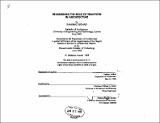Reassessing the role of tradition in architecture
Author(s)
Arshad, Shahnāz
DownloadFull printable version (16.64Mb)
Other Contributors
Massachusetts Institute of Technology. Dept. of Architecture.
Advisor
William L. Porter.
Terms of use
Metadata
Show full item recordAbstract
This study stems from a deep dissatisfaction with contemporary architectural trends in Pakistan today, coupled with an acute awareness that the long-established traditions the society is endowed with remain ignored. It questions the disparity between traditional and contemporary built environments, and seeks to understand the process which led from the one to the other. And in so doing, it attempts to identify the continuities that remained and the changes that occurred. The study begins with the conviction that traditions still remain important in the society. This hypothesis is supported by a theoretical debate and practical evidence, in an effort to identify the common threads that transcend time and thus form these traditions. The evidence is gathered through an examination of residential environments built in successive time periods- from historical to contemporary and their comparative analysis. The research is based on original newly discovered data, oral history, on-site investigations, and where available, existing information. The comparative analysis is approached from three angles - architecture, living patterns, and user feedback. And through this analysis emerge the forces of change and the threads of continuities affecting the environment and its use. The traditions thus identified are currently often regarded as contrary to progress, and therefore redundant. This thesis seeks to re-establish their enduring validity by confirming their persistent presence and continued value.
Description
Thesis (M.S.)--Massachusetts Institute of Technology, Dept. of Architecture, 1988. Bibliography: leaves 128-131.
Date issued
1988Department
Massachusetts Institute of Technology. Department of ArchitecturePublisher
Massachusetts Institute of Technology
Keywords
Architecture.